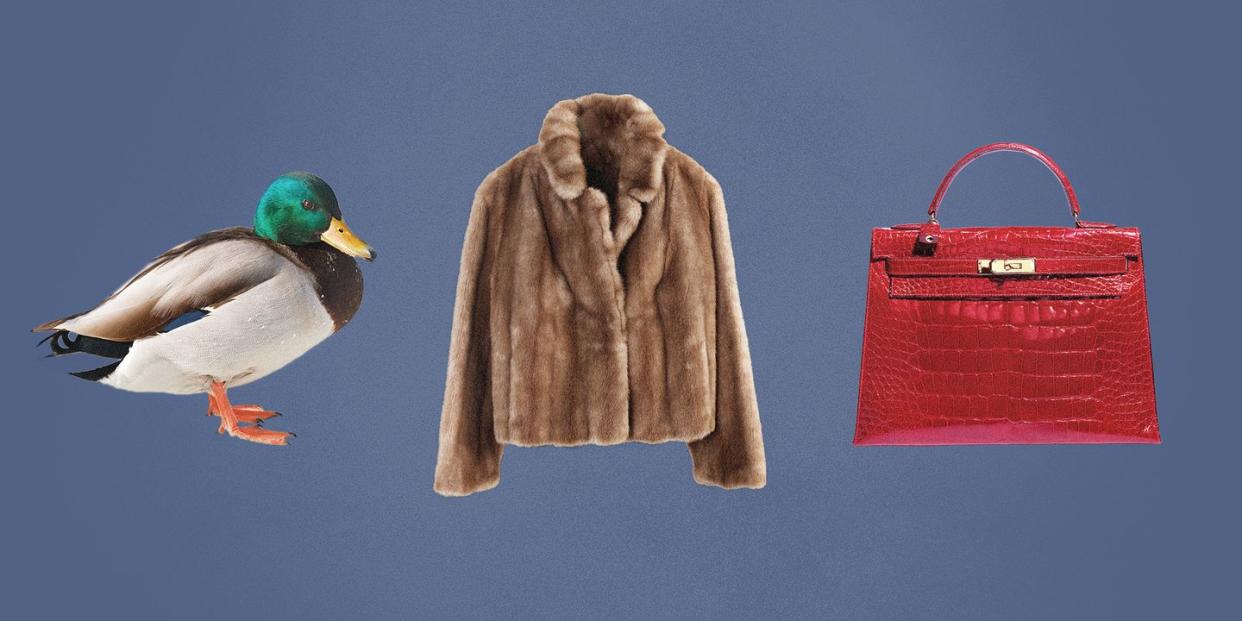Foie Gras and Exotic Skins Are Being Outlawed—and the One Percent Are Less Than Pleased

At Los Angeles International Airport recently, the handsome chef of a Michelin-starred restaurant was detained for trying to bring into the country an unusual cargo: 40 frozen piranhas. In a duffel bag, no less.
Virgilio Martínez, whose restaurant, Central, in Lima, Peru, is ranked among the world’s best, claimed to be unfamiliar with the U.S. Customs and Border Protection list of restricted species. And who can blame him? The number of prohibited imports is so vast—from the sublime (poulet de Bresse, widely considered the Rolls-Royce of chicken) to the ridiculous (Kinder Surprise eggs)—that it’s easier to keep up with the ever-multiplying Kardashians.
“What’s next?” asks designer Josie Natori. “You almost need a road map to find out what’s allowed and not allowed. It’s so hard to keep track.”

It’s a state of affairs that’s likely to become even more of a head-scratcher in 2020 and beyond. While some states, such as Illinois, have rolled back laws on, say, recreational marijuana, other states are taking the opposite tack on more extravagant highs. Beginning in 2022, the sale of foie gras (the fattened liver of duck or goose) will be illegal in New York City; transgressors could face up to $2,000 in fines. Motivated by concerns over animal cruelty (mostly over the process of gavage, or force-feeding, which is how most but not all foie gras is produced), the ban by the city council has chefs—especially those working in upscale French kitchens—up in arms in a way not seen since beluga caviar was banned 15 years ago.
The proposed ban will undeniably affect upstate duck farmers and the thousand or so New York City restaurants that serve foie gras, but the sacré bleu–level indignation (Will they come for veal next? Not my truffles!) is nothing compared to the fits of pique gripping California as the state readies itself for a possible ban on exotic skins.
Having successfully outlawed the sale of all new fur products statewide (beginning in 2023), Governor Gavin Newsom signed a bill enforcing a ban on the import or sale of crocodile and alligator skins effective January 2020.
“It’s ridiculous,” says Farah Makras, a San Francisco socialite and fashion plate. “The ways that animals are raised or whether they are treated well is the problem, not customers.”

That is an opinion shared, not surprisingly, by Jason Stalvey, a New York designer of high-end accessories made from alligator. He sees exotic skins as collateral damage in fashion’s race to embrace more ethical production practices. “Unfortunately, taking a stand against exotics actually works against sustainable efforts that have been in place and overseen by the government for the last 40 years,” says Stalvey, whose namesake line counts Beyoncé and Gigi Hadid as fans.
A federal judge appears to agree, having issued a temporary restraining order against the ban after the state of Louisiana sued California, claiming that the regulation could hurt its economy. A hearing won’t be held until late April.
Should animal rights activists prevail, it’s safe to assume their patrician adversaries everywhere, from Pacific Heights to Pacific Palisades, will find a way to bypass regulators. “When they originally banned fur in San Francisco, everyone was going to Los Angeles—or even just 10 minutes outside San Francisco,” Makras says. “And we’re so close to Nevada. People will just go to Reno or Vegas. Someone will make millions opening a little fur shop just over the border.”
It’s amusing to imagine the lengths to which the one percent might go to acquire their decadent but outlawed goodies—grandes dames going through customs with Birkins stuffed with tins of beluga! Snakeskin minibags concealed under wigs! Third or fourth homes in Idaho! Well, as a last resort they could just bring in everything, from absinthe to Cuban cigars to underaged raw-milk cheese, on their private jets, as they’ve always done.
As one executive from a marquee label known for its prized exotics confided (on condition of anonymity), “Luxury clients are highly mobile… They go where the inventory is!”
And it’s not as though they can get in trouble any deeper than the odd fine. The onus, after all, falls mainly on the retailers. “There is no exotic skin or fur fashion police coming after you,” quips Emily Holt, a former Vogue editor and owner of the tony Bay Area boutique Hero Shop.

Don’t be so sure. After all, it wasn’t so long ago that the members of the Shiny Set, as Nicholas Coleridge famously called America’s couture-wearing dames in his book The Fashion Conspiracy, were shocked to discover that one of their newfound luxuries, the shahtoosh shawl (that gossamer-thin, mylar-warm, status-conferring, handwoven scarf from Kashmir that went from nowhere to everywhere in the late 1980s and early ’90s), was in fact on the banned list of the U.S. Fish and Wildlife Service.
Longtime readers will recall that in the summer of 1999 more than 100 ladies who lunch, including Nan Kempner, were served subpoenas ordering them to appear before a grand jury and to bring with them “any and all shahtoosh shawls…and items made from the Tibetan antelope, chiru, or ibex.” As it turns out, the animals were being slaughtered in great numbers by poachers. It was the biggest slap in the face of society since Dewi Sukarno terrorized the scene. “What do you mean, people have to turn in their shahtooshes?” Pat Buckley asked a reporter at the time. “Some of our friends will have to call a moving van.”
The viability of the California skin ban is unresolved, but if the shahtoosh smackdown taught socialites anything, it’s that they need to be creative if they want to save their skins. Says Makras, “If there is a will, there is a way.”
This story appears in the March 2020 issue of Town & Country. SUBSCRIBE NOW
You Might Also Like

